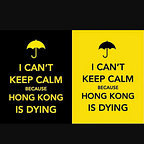“Hong Kong Independence” Can Never Be Successful
In the article, “The Growth of “Localism” in Hong Kong”, published in China perspectives, Kwong, the writer, strives to examine why there has been an increase in localist groups, what impact this will have on the democratic camp as a whole, and how the authorities have responded. Kwong implies that since the sovereignty of Hong Kong from the United Kingdom return to the People’s Republic of China in 1997, growing number of Hong Kong people, especially youngsters, are increasingly concerned about Beijing’s growing encroachment on the territory’s freedoms and the failure of the Hong Kong government to deliver actual democracy, universal suffrage; therefore, many youngsters in Hong Kong distrust the existing pan-democratic parties, and decided to shift into the localist camp in order to search for new direction against political intervention by China.
After 156 years of ruling under British Empire, Hong Kong has developed along its own path and is rather detached with mainland socially and politically. The handover agreement, signed in 1984, guaranteed Hong Kong “a high degree of autonomy except in foreign and defense affairs,” a deal known as “One country, Two systems”. Nevertheless, as a matter of fact, things which China government has done to Hong Kong have violated the principle of “One country, Two systems”; therefore, the idea of localism has developed. Localism consists of a variety of groups with different goals, and all of them are just people who want total independence from the China to people who think that the government should just worry more about local issues. After reading the article “The Growth of “Localism” in Hong Kong”, I think that people who oppose the Umbrella Movement are wrong because people overpass the fact that universal suffrage, which was what the umbrella movement protesters were fighting for, is one of the fulfillment of the commitment in the Hong Kong Basic Law.
According to Kwong, in recent years, because of the fear that people in Hong Kong have had, it brings out the idea of “Hong Kong Independence”, the right which people in Hong Kong have to self-determination. For instance, Kwong writes, “Hong Kong people have been dealing with the “China factor”for more than a decade. More people are worried that existing mainland — Hong Kong integration actually provides more opportunity for Beijing to exercise political control over Hong Kong, resulting in the loss of local identity” (65). Kwong also states that the people’s trust in Beijing government is another significant factor of why people support Hong Kong to be independent. For example, Kwong notes, “in late 2008, the year of the Beijing Olympics, 53.1% of respondents trusted the Beijing government, with only 14.4% not trusting it, while by the end of 2015, about 40% did not trust it, with only 35.2% trusting it” (65). In 2014, the failure of the umbrella movement indicated that the Beijing government was not interested in offering real democracy to Hong Kong people, which result in disappointing a large number of people, as evidenced by a drop in trust toward the Beijing government.
All in all, even though I personally support the idea of “Hong Kong Independence”, I do not think that it would be successful because according to the Basic Law, “The Hong Kong Special Administrative Region is an inalienable part of the People’s Republic of China.” The purpose why people designed and created law is to protect the individual against an abuse of power by the government or public bodies. Obeying the law sets a societal standard and helps confirm to society that the laws are valid. However, according to the Basic Law, it also states that “The method for selecting the Chief Executive shall be specified in the light of the actual situation in the Hong Kong Special Administrative Region and in accordance with the principle of gradual and orderly progress. The ultimate aim is the selection of the Chief Executive by universal suffrage upon nomination by a broadly representative nominating committee in accordance with democratic procedures.” In the sense of justice, every Hong Kong citizen must obey the law, and so do the government. The basic law indicates that the Chief Executive of Hong Kong should be elected by universal suffrage, which was what protesters of the umbrella movement were aiming for. Helplessly, even though the sovereignty of Hong Kong has returned to China for 20 years, the Chief Executive is still only decided by an election committee, which is made up of the 70 members of Hong Kong’s legislative chamber, and a mix of professionals, business and trade elites, of 1,194 members. When the government does not obey the law, I do not see a point of why people in Hong Kong fighting for their rights is a wrong thing to do.
Work Cited
- China. Basic Law: The Basic Law of the Hong Kong Special Administrative Region of the People’s Republic of China. Hong Kong: Hong Kong Special Administrative Region of the People’s Republic of China, n.d. Print.
- Kwong, Ying-Ho. “The Growth of ‘Localism’ in Hong Kong.” China Perspectives, 3 (2016): 63–68.
